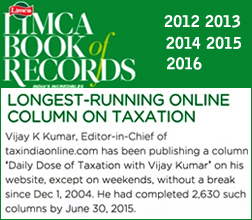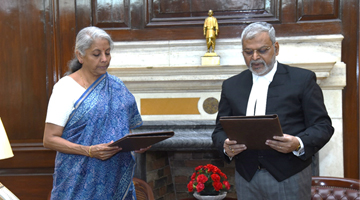 TIOL-DDT 2877 TIOL-DDT 2877
28 06 2016
Tuesday
AS per the Transfer Policy of the CBEC, "All annual transfer orders shall be normally issued by 30th April and, in any case, not later than 31st May of the year". We are completing June and CBEC is not yet able to issue the transfer orders of the Commissioners. Work in the Commissionerates is held up with everybody hoping for a transfer/retention or in fear of it. Rumours and gossip are doing the rounds and the only topic of interest in the Commissionerates is TRANSFER.
The other day, I was witness to a Commissioner's tirade against the Board for its inefficiency, incompetence, inability and irresponsibility. He said, "The Board fixes various time limits for us and takes us to task if we don't meet their deadlines, but why does the Board not meet the dateline fixed by it?". He said that the Board had a duty and responsibility to complete the transfers within the time stipulated and the Board had totally failed.
Transfer of Commissioners is not all that an easy job and to be fair to the Board, it is not entirely in its hands. It is a very complicated procedure involving the Board, the Revenue Secretary, the Minister of State and the Finance Minister. Any change suggested at any stage will bring the game back to Square One and the whole process has to start all over again. And so many factors contribute to the delay and there is always a lot of outside influence.
Using Outside Influence by Revenue Officers - Action to be initiated?
AS per Rule 20 of the Central Civil Services (Conduct) Rules, 1964, "No Government servant shall bring or attempt to bring any political or other outside influence to bear upon any superior authority to further his interests in respect of matters pertaining to his service under Government."
CBDT notes that despite CBDT's advisory for desisting from approaching MPs/MLAs in the service matter by the officials of the department, a number of MP/VIP references are still being received.
Board wants action to be initiated against officers who bring in outside influence.
This is a usual annual instruction which is not really taken seriously by the officers. The name of the game is 'the outside influence should be powerful enough.'
If the Boards/Government are serious about curtailing the menace of VIP interference in transfers, why can't they reject all recommendations and really take action against those who bring in political or other pressure?
Very recently, the CBEC has communicated to the Chief Commissioners some VIP references about appointment of Standing Counsel in High Courts!
In DDT 2380 23.06.2014, I wrote,
Transfer and posting is big business in CBEC and some of the Customs and Central Excise officers are capable of influencing the topmost authorities of this country. Even for very junior posts like Inspectors, recommendations from the highest authorities are brought in. Very recently we heard about large sums of money being given to the staff of a Minister for a particular post as a Member of a Board! Politicians have a big role in transfers and as long as they have their say, they cannot simply shoo away their party workers. This does not mean that transfers should be the exclusive domain of the bureaucrat. Without a politician to check him, the bureaucrat will go berserk. Often the senior babus have no concern or sympathy for their subordinates and will not listen to reason - this is one of the reasons why the babus have to approach the politicians for recommendations. If the senior babu was a little fair and reasonable, the politician would have had no role.
The only solution is to make the system totally transparent and computerised. Transfers should be finally done by a Committee consisting a couple of employees after a session of counselling with the affected employees and everything recorded and everybody accountable.
But who will do this? Who would like to abdicate his power and the power to transfer is the absolute power in Government.
CBDT F.No. HRD/CM/104/2/2016-17., Dated: June 27 2016
Frugal CESTAT - Low Cost Justice
THE Government does not spend much money on running the Tribunal. The CESTAT was given a budget of Rs. 26.73 Crore for 2015-16. Out of this, the Tribunal spent only Rs. 26.54 Crore, saving over 19 lakh rupees from the budgeted expenditure.
The Budget for some wings of the CBEC for the same period were:
|
Sl.No.
|
Department
|
Budget (in Crores of rupees)
|
|
1
|
Directorate of Inspection
|
63.27
|
|
2
|
Directorate of Systems
|
239.04
|
|
3
|
NACEN (National Academy of Customs, Excise & Narcotics)
|
105.30
|
|
4
|
Directorate of Publicity and Public Relations
|
57.54
|
|
5
|
Directorate of Central Excise Intelligence
|
52.07
|
Service Tax - RTI Information is Valid Proof that Main Contractor Discharged Service Tax Liability
MANY sub-contractors get stuck with service tax Show Cause Notices and when they take the plea that the main contractor has discharged the tax liability on the whole value, they are not able to produce proof for the same. The main contractors are usually big business houses or PSUs and don't bother to oblige the sub-contractor with proof of payment of Service Tax for the whole amount. What does the poor sub-contractor do in such cases?
RTI seems to be an option, at least as far as PSUs are concerned.
In an interesting case before the CESTAT recently, the appellant who was a sub-contractor took the plea that he was not liable to pay Service Tax as the main contractor has discharged the Service Tax liability. To establish this, the appellant furnished information received from the main contractor under RTI Act, 2005 showing that the main contractor has discharged the service tax liability on the said services.
The Revenue argued that the appellant failed to establish that service tax liability was discharged by the main contractor; that the information/reply received under RTI Act is not conclusive proof of payment of tax and cannot be accepted.
The Tribunal observed,
The information/document made available by the Public Information Officer (PIO) is something which is already recorded in the official records of the public office/authority. On receiving application, the PIO just furnishes a copy of the information contained in the records kept in proper custody. Section 3 of RTI Act states that every citizen shall have the right to information and may obtain the same by submitting an application. The information having been provided by a public officer under the provision of Right to Information Act, 2005, I do not find any reason to disbelieve the same.
The appeal was allowed.
For more details, please see Breaking News
Central Excise Duty on Waste and Scrap
IN a recent meeting of the Regional Advisory Committee of Hyderabad Central Excise Zone, a point was raised,
CBEC Instruction in F.No.96/85/2015-CX.I., Dated: December 07, 2015 has communicated minutes of the meeting of Chief Commissioners held on 28/29th October, 2015. One of the issues discussed at the said meeting was on the duty on waste and scrap. The conference decided that henceforth waste & scrap are to be treated as "non excisable goods". In view of this decision, Industry wants confirmation on
(a) Since waste and scrap sold are "non excisable goods", no excise duty will be payable and
(b) that for the purpose of Rule 6 (3) the value of clearances of waste and scrap will be treated as 'exempted goods".
The Department replied:
It is seen from the Minutes of the Tariff Conference circulated vide Board's letter F.No.96/85/2015 dated 07.12.2015 that a point raised by the Meerut Zone for discussion and decision on an issue that Bagasse, press mud in sugar factory and Zinc and aluminium ash/dross in non-ferrous metal industry have been held as non-excisable by the Hon'ble Supreme Court in the case of M/s. DSCL Sugar Limited, - 2015-TIOL-240-SC.
The conference noted that Hon'ble Supreme Court in the case of M/s. DSCL Sugar Limited has held that Sections 2(d) and 2(f) of the Central Excise Act, 1944 have to be satisfied conjunctively for imposition of Excise duty under Section 3 of the Act.
Therefore, goods which are not manufactured would not be chargeable to Central Excise duty even after amendment in Section 2(d). However, rule 6(1) of the Cenvat Credit Rules, 2004 has been amended vide notification no. 6/2015-C.E (N.T) dated 1.3.2015, providing that for the purposes of Rule 6 of the CENVAT Credit Rules, 2004, non-excisable goods shall be considered/treated as exempted goods. Therefore, input and input services credit relatable to manufacture of such non-excisable goods would need to be reversed by the assessee in the same way as it is required to be reversed for the exempted goods. Non-excisable goods and exempted goods are required to be treated in the same manner w.e.f. 1.3.2015 under Rule 6 of the CENVAT Credit Rules, 2004.
Therefore, it was made clear that the said clarification was specifically issued with reference to the waste/scrap which are not manufactured/produced from inputs on which Cenvat credit was taken and cannot be generalized to all the types of waste and scrap. Further it was also made clear that the excisability of waste and scrap depends on nature of waste and scrap and is to be decided on a case to case basis.
Until Tomorrow with more DDT
Have a nice Day.
Mail your comments to vijaywrite@tiol.in |









 Download PDF
Download PDF




